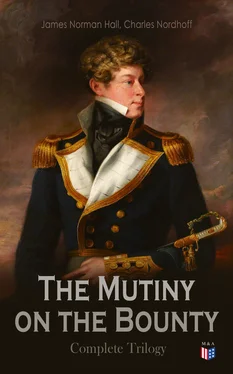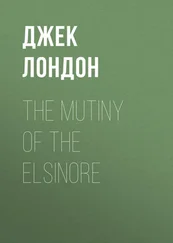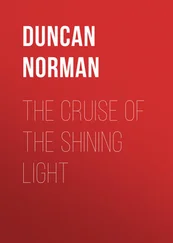As we bore away for Tetiaroa I began to appreciate the qualities of Hitihiti’s canoe. Amidships, a long, heavy plank, adzed out of a breadfruit tree, extended from the outrigger float, across the gunwales, and well outboard on the weather side. Four or five of the heaviest men of our crew now took their places on this plank, well out to windward, to prevent us from capsizing in the gusts. Two other men were employed constantly in bailing, as the canoe tore through the waves at a speed of not less than twelve knots. The Bounty sailed well, as ships went in those days, but Hitihiti’s little vessel would have sailed two miles to her one. The chief and I sat side by side on a seat in her high stern, well above the spray which flew over her bows as she sliced through the waves.
At considerable hazard we ran our canoe over the reef and into the calm waters of the Tetiaroa lagoon. There we were soon surrounded by small canoes and swimmers, all eager to impart some information of importance: the deserters, fearing pursuit, had set sail two or three hours before, some thought for Eimeo, others for the west side of Tahiti. The wind was dying away, as it does toward sunset in this region, and since darkness would soon set in and we had no certain knowledge of Churchill’s destination, Hitihiti deemed it best to spend the night on Tetiaroa, and return to Bligh with our news when the morning breeze made up.
I shall not forget the night I spent on the coral island. The Indians of Tahiti are by nature a people given over to levity, passionately devoted to pleasure, and incapable of those burdens of the white man—worry and care. And in Tetiaroa, their watering place, they seemed to cast aside whatever light cares of family and state they feel when at home, and pass the time in entertainments of every kind, by night and by day. Relieved of his mission, which I am convinced he would have done his utmost to accomplish under other circumstances, Hitihiti now seemed to forget everything but the prospects of entertainment ashore, directing his paddlers to make at once for the nearest islet, called Rimatuu.
Three or four chiefs and their retinues were on the islet at the time, and, as its area was no more than five hundred acres, the place seemed densely populated. We were lodged at the house of a famous warrior named Poino, whose recent excesses in drinking the ava had nearly cost him his life. He lay on a pile of mats, scarcely able to move, his skin scaling off and green as verdigris, but Hitihiti informed me that in a month he would be quite restored. Several of Poino’s relatives had accompanied him to Tetiaroa, and among them was a young girl, a member of the great Vehiatua family of Taiarapu, in charge of two old women. I had a glimpse of her in the distance as we supped, but thought no more of the young lady till after nightfall, when I was invited to see a heiva, or Indian entertainment.
Strolling with Hitihiti through the groves, we saw the flare of torchlight some distance ahead, and heard the beating of the small drums—a hollow, resonant sound with a strange measure. My friend’s head went up and his step quickened. Ahead of us, in a large clearing, there was a raised platform of hewn blocks of coral, about which no less than two or three hundred spectators were seated on the ground. The scene was brightly illuminated by torches of coconut leaves, bound in long bundles and held aloft by serving men, who lighted fresh ones as fast as the old burned out. As we took our places, two clowns, called faaata, were finishing a performance which raised a gale of laughter, and as they stepped off the platform six young women, accompanied by four drummers, trooped on to perform. These girls were of the lower order of society, and their dance was believed by the Indians to ensure the fertility of the crops. The dress of the dancers consisted of no more than a wreath of flowers and green leaves about their waists, and the dance itself, in which they stood in two lines of three, face to face, was of a nature so unbelievably wanton that no words could convey the least idea of it. But if the clowns had raised a gale of laughter, the dance raised a hurricane. Hitihiti laughed as heartily as the rest—the antics of one girl, in fact, brought the tears to his eyes and caused him to slap his thigh resoundingly. Presently the dance was over and, in the pause that followed, my taio informed me that we were now to see a dance of a very different kind.
The second group of dancers came through the crowd, which parted right and left before them, each girl escorted by two old women and announced by a herald, who shouted her name and titles as she stepped on to the platform. All were dressed alike and very beautifully, in flowing draperies of snow-white Indian cloth, and the curious headdresses called tamau. They carried fans, with handles curiously carved, and over their breasts they wore plates of pearl shell, polished till they gleamed like mirrors, and tinted with all the colors of the rainbow. Selected for their beauty, nurtured with the greatest care, kept constantly in the shade, and beautified with the numerous Indian cosmetics, these girls were of the most exquisite loveliness. Poino’s young relative, the second to be announced, caused a murmur of admiration among the spectators.
Like all the Indians of the upper class, she was a full head taller than the commoners. Her figure was of the most perfect symmetry, her skin smooth and blooming as an apricot, and her dark lustrous eyes set wide apart in a face so lovely that I caught my breath at sight of her. While the herald announced her long name, and longer list of titles, she stood facing us, her eyes cast down proudly and modestly. Judging that the announcement was unintelligible to me, Hitihiti leaned over and whispered the girl’s household name.
“Tehani,” he announced in my ear, which is to say “The Darling,” a name by no means inappropriate, I thought. The hura is danced in couples, and next moment Tehani and the first girl began to dance. The measure is slow, stately, and of great beauty, the movements of the arms, in particular, being wonderfully graceful and performed in the most exact time. When Tehani and her companion retired from the stage, amid hearty applause, they were succeeded by a brace of clowns, whose antics kept us laughing till the next pair of girls was ready to dance. But I scarcely noticed the other performers, for I was eager to return to the house, whither I knew Tehani had been led. It was fortunate for my work and my peace of mind, I thought somewhat ruefully, that she was not a member of Hitihiti’s household, yet I knew that I would have given anything I possessed to have had her there. But I was not destined to see her again in Tetiaroa, for her two old duennas guarded her closely in a small separate house.
We sailed about two hours after sunrise, with the east wind abeam, and I was able to make my report to Mr. Bligh the same afternoon. The deserters were not apprehended till nearly three weeks later, when they gave themselves up, worn out by guarding against the constant attempts of the Indians to capture them. Churchill was given two dozen lashes, and Muspratt and Millward four dozen each.
The Bounty had at this time been shifted to a new anchorage in the harbour of Toaroa, where she was moored close to the shore. It had been Bligh’s intention to have Hayward flogged with the deserters, and on the morning of the punishment, happening to be on board, I saw Hayward’s taio, a chief named Moana, standing on deck with a sullen and gloomy face. But at the last moment the captain changed his mind and ordered Hayward below, to serve out the balance of his month in irons. On the same night an incident occurred which might have caused the loss of the ship and left us marooned among the Indians without the means of returning to England. The wind blew fresh from northwest all night, directly on shore, and at daybreak it was discovered that two strands of the small bower cable had been cut through, and that only one strand was holding the Bounty off the rocks. Mr. Bligh made a great to-do about the affair, but it was not till sometime afterwards that I learned the truth of it.
Читать дальше











